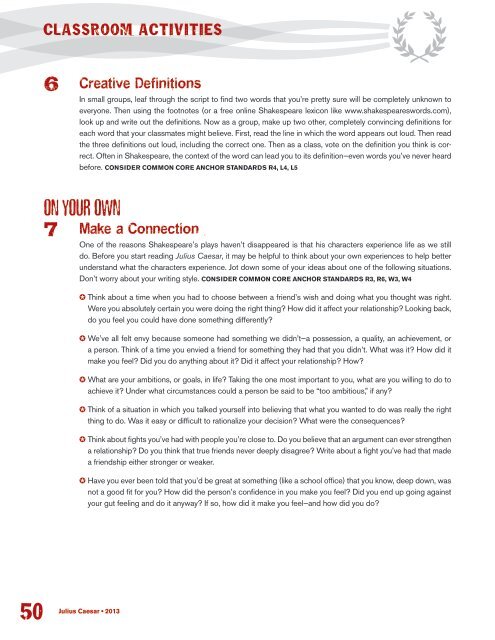Julius Caesar • 2013 - Chicago Shakespeare Theater
Julius Caesar • 2013 - Chicago Shakespeare Theater
Julius Caesar • 2013 - Chicago Shakespeare Theater
Create successful ePaper yourself
Turn your PDF publications into a flip-book with our unique Google optimized e-Paper software.
50<br />
CLASSROOM ACTIVITIES<br />
6 Creative Definitions<br />
In small groups, leaf through the script to find two words that you’re pretty sure will be completely unknown to<br />
everyone. Then using the footnotes (or a free online <strong>Shakespeare</strong> lexicon like www.shakespeareswords.com),<br />
look up and write out the definitions. Now as a group, make up two other, completely convincing definitions for<br />
each word that your classmates might believe. First, read the line in which the word appears out loud. Then read<br />
the three definitions out loud, including the correct one. Then as a class, vote on the definition you think is correct.<br />
Often in <strong>Shakespeare</strong>, the context of the word can lead you to its definition—even words you’ve never heard<br />
before. CONSIDER COMMON CORE ANCHOR STANDARDS R4, L4, L5<br />
ON YOUR OWN<br />
7 Make a Connection<br />
One of the reasons <strong>Shakespeare</strong>’s plays haven’t disappeared is that his characters experience life as we still<br />
do. Before you start reading <strong>Julius</strong> <strong>Caesar</strong>, it may be helpful to think about your own experiences to help better<br />
understand what the characters experience. Jot down some of your ideas about one of the following situations.<br />
Don’t worry about your writing style. CONSIDER COMMON CORE ANCHOR STANDARDS R3, R6, W3, W4<br />
✪ Think about a time when you had to choose between a friend’s wish and doing what you thought was right.<br />
Were you absolutely certain you were doing the right thing? How did it affect your relationship? Looking back,<br />
do you feel you could have done something differently?<br />
✪ We’ve all felt envy because someone had something we didn’t—a possession, a quality, an achievement, or<br />
a person. Think of a time you envied a friend for something they had that you didn’t. What was it? How did it<br />
make you feel? Did you do anything about it? Did it affect your relationship? How?<br />
✪ What are your ambitions, or goals, in life? Taking the one most important to you, what are you willing to do to<br />
achieve it? Under what circumstances could a person be said to be “too ambitious,” if any?<br />
✪ Think of a situation in which you talked yourself into believing that what you wanted to do was really the right<br />
thing to do. Was it easy or difficult to rationalize your decision? What were the consequences?<br />
✪ Think about fights you’ve had with people you’re close to. Do you believe that an argument can ever strengthen<br />
a relationship? Do you think that true friends never deeply disagree? Write about a fight you’ve had that made<br />
a friendship either stronger or weaker.<br />
✪ Have you ever been told that you’d be great at something (like a school office) that you know, deep down, was<br />
not a good fit for you? How did the person’s confidence in you make you feel? Did you end up going against<br />
your gut feeling and do it anyway? If so, how did it make you feel—and how did you do?<br />
<strong>Julius</strong> <strong>Caesar</strong> <strong>•</strong> <strong>2013</strong>




